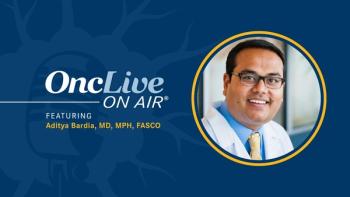
Dr Thompson on the Necessity of Surgery and Radiation Therapy in Early-Stage Breast Cancer
Alastair Thompson, BSc, MBChB, MD, FRCS, discusses ongoing challenges in determining the optimal treatment strategy for patients with early-stage breast cancer.
Alastair Thompson, BSc, MBChB, MD, FRCS, professor, chief, Division of Surgical Oncology, Section of Breast Surgery, Olga Keith Wiess Chair of Surgery, Baylor College of Medicine;
co-director, Lester and Sue Smith Breast Center, co-associate director, clinical research, Dan L. Duncan Comprehensive Cancer Center, discusses ongoing challenges in determining the optimal treatment strategy for patients with early-stage breast cancer, including the necessity of surgery and adjuvant radiation therapy.
Emerging evidence from ongoing trials including data from a phase 2 trial (NCT02945579) are beginning to show that patients with early-stage breast cancer who achieve a pathologic complete response (pCR) to neoadjuvant chemotherapy may be able to skip surgery and receive standard radiation treatment with a low chance of recurrence. Despite these findings, Thompson notes that the lack of definitive data and absence of clinical guidelines presents a significant challenge in everyday practice.
The phase 3 HERO trial (NCT05705401) is an ongoing, randomized trial evaluating the efficacy of HER2-targeted therapy with or without radiation therapy in the adjuvant setting following breast-conserving surgery in patients with early-stage, low-risk, HER2-positive breast cancer. The study is including patients with tumors less than 3 cm in size who have node-negative disease, and all patients are undergoing neoadjuvant therapy and surgery prior to randomization.
Thompson explains that trials such as HERO could be important in potentially reshaping the future management of early-stage breast cancer. Results could provide insights into the feasibility and safety of omitting surgery or radiation therapy in select patient populations, ultimately contributing to more tailored and less invasive treatment strategies, he concludes.
Within the broader scope of clinical practice, Thompson continues to advocate for the established standard of care. Even in cases where imaging and other diagnostic tools suggest that no residual tumor remains, he underscores the importance of adhering to current standard-of-care practices. This involves performing surgery to excise the residual tumor bed and offering conventional radiation therapy. This approach ensures that patients receive treatment that aligns with the best available evidence to reduce the risk of recurrence and optimize outcomes.


































